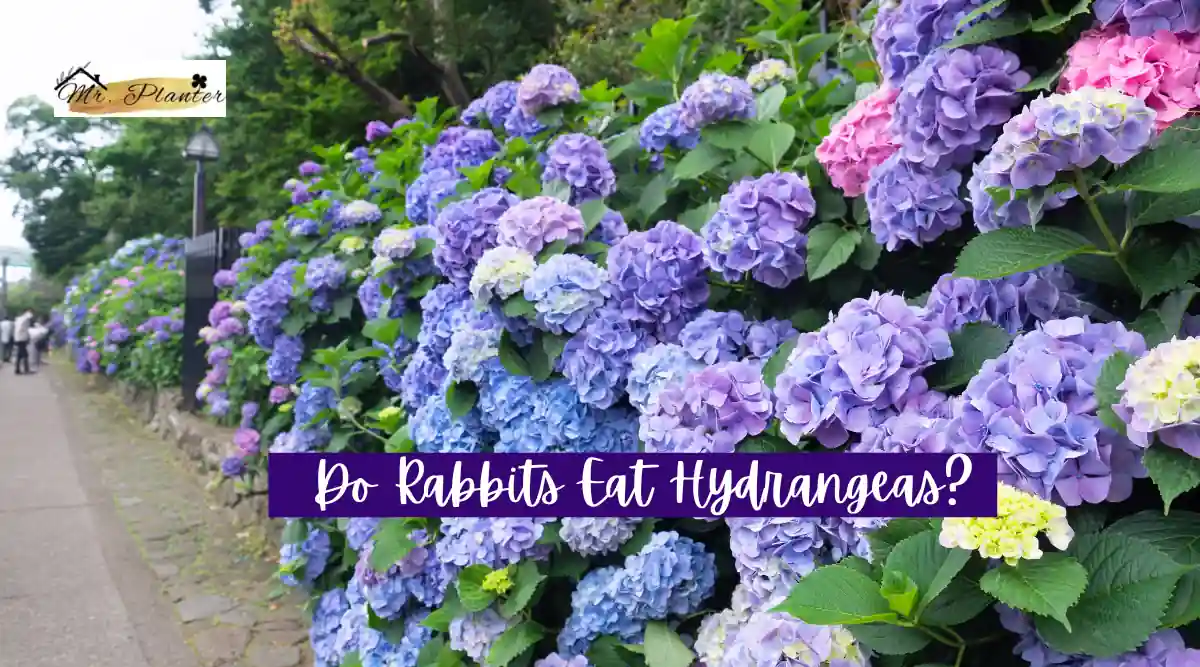Are you wondering if rabbits eat hydrangeas? Unfortunately, the answer is yes. Rabbits are herbivores and will eat a variety of plants, including hydrangeas.
While they may not actively seek out hydrangeas, they will take a bite if they are hungry enough and smell one nearby.
If you have hydrangeas in your garden, it’s important to take steps to prevent rabbits from eating them. This can be especially important in the winter when other food options may be scarce.

Rabbits may gnaw on the woody stem of hydrangeas during the winter season, causing damage to the plant.
Key Takeaways
- Rabbits do eat hydrangeas and can cause damage to the plant.
- Rabbits may eat the whole hydrangea plant, including the leaves, bark, and flower buds.
- To prevent rabbits from eating your hydrangeas, you can use physical barriers, repellents, or plant alternative flowers that rabbits don’t eat.
Do Rabbits Eat Hydrangeas?
If you’re a gardener, you may have noticed that your hydrangeas are being nibbled on. You might be wondering if rabbits are the culprit. The answer is yes, rabbits do eat hydrangeas.
Hydrangeas are a favorite food of rabbits, especially during the winter months when other food sources are scarce. Rabbits will eat the leaves, stems, and even the flowers of the hydrangea plant.
However, it’s important to note that not all rabbits will eat hydrangeas. Some rabbits may prefer other plants or may not be interested in eating hydrangeas at all.
Do Rabbits Eat Hydrangeas in the Winter?
During the winter season, rabbits may be more likely to eat hydrangeas due to the scarcity of other food options.
While they may not necessarily eat the entire plant, they will gnaw and chew on the woody stems, which can cause significant damage to the plant.
Rabbits have an appetite that varies with the different growing periods. During the winter, when food is scarce, they are more likely to eat the woody stems of the hydrangea plant.
This can be harmful to the plant, as it can stunt its growth and cause it to produce fewer flowers in the spring.
If you live in an area with a lot of rabbits, it’s important to take steps to protect your hydrangeas during the winter months.
One way to do this is by wrapping the stems of the plant with chicken wire or a similar material. This will prevent rabbits from gnawing on the stems and causing damage to the plant.
Another option is to provide rabbits with an alternative food source during the winter months.
This can be done by planting other types of plants that rabbits prefer to eat, such as clover or alfalfa. By providing rabbits with an alternative food source, you can help to protect your hydrangeas and ensure that they continue to grow and thrive.
In conclusion, rabbits may be more likely to eat hydrangeas during the winter season due to the scarcity of other food options.
To protect your hydrangeas, it’s important to take steps to prevent rabbits from gnawing on the stems of the plant. This can be done by wrapping the stems with chicken wire or providing rabbits with an alternative food source.
Will Rabbits Eat the Whole Hydrangea Plant?
Rabbits are known for their voracious appetite, and hydrangeas are no exception. Yes, rabbits will eat the whole hydrangea plant if they have access to it.
However, the extent of the damage caused by rabbits depends on various factors, including the age and size of the plant, the type of hydrangea, and the rabbit’s feeding habits.
If rabbits are hungry and there is no other food source available, they may devour the entire plant.
This can be especially true for young and small hydrangeas, which are easy targets for rabbits. In contrast, larger and more mature plants may not be completely eaten by rabbits, but they can still cause significant damage by nibbling on the leaves, stems, and flowers.
It is also worth noting that some types of hydrangeas are more attractive to rabbits than others.
For example, the smooth hydrangea (Hydrangea arborescens) and the oakleaf hydrangea (Hydrangea quercifolia) are less likely to be eaten by rabbits, while the bigleaf hydrangea (Hydrangea macrophylla) and the mountain hydrangea (Hydrangea serrata) are more susceptible to rabbit damage.
How to Keep Rabbits From Eating Your Hydrangeas?
If you’re a gardener, you know how frustrating it can be to see your beautiful hydrangeas get eaten by rabbits.
Fortunately, there are several ways to keep rabbits from eating your hydrangeas.
Here are some effective methods you can try:
Grow Oakleaf Hydrangea Instead
Rabbits prefer to eat smooth hydrangea varieties, so growing oakleaf hydrangea can be a good alternative.
Oakleaf hydrangea has a rougher texture, making it less appealing to rabbits.
Additionally, oakleaf hydrangea is a native plant, which means it’s better adapted to local growing conditions and requires less maintenance.
Apply Fencing
Fencing is one of the most effective ways to keep rabbits away from your hydrangeas.
You can install a short fence around your garden to prevent rabbits from accessing your plants.
Rabbits can’t jump very high, so a fence that’s at least two feet tall should be enough to keep them out.
Add Motion Activated Sprinkler
Motion-activated sprinklers can also be an effective way to keep rabbits away from your hydrangeas.
These sprinklers use infrared sensors to detect movement and spray water when an animal comes too close.
The sudden burst of water can startle rabbits and discourage them from coming back.
Sprinkle Coffee Ground to Repel Rabbits
Rabbits don’t like the smell of coffee, so sprinkling coffee grounds around your hydrangeas can be an effective repellent.
You can also mix the coffee grounds with water to create a spray and apply it directly to your plants.
Apply Predator Scents on Hydrangea
Rabbits are prey animals, so the smell of predators can be enough to keep them away.
You can buy predator urine or scented repellents from a garden center and apply them around your garden to create a natural barrier.
Have Rabbit Repellents Near Hydrangeas
Finally, you can try using rabbit repellents to keep rabbits away from your hydrangeas. These repellents are typically made from natural ingredients like garlic, pepper, and vinegar, and can be sprayed directly on your plants.
Rabbit repellents can be an effective short-term solution, but they may need to be reapplied regularly to maintain their effectiveness.
By using these methods, you can keep rabbits from eating your hydrangeas and enjoy a beautiful garden all season long.
Alternative Flowers that Rabbits Don’t Eat
If you’re looking for alternative flowers to plant in your garden that rabbits won’t eat, there are many options available.
Here are some of the most popular ones:
- Marigolds: These bright, colorful flowers are not only beautiful, but they also repel rabbits with their strong scent.
- Alyssums: These low-growing flowers are perfect for borders and edging, and they are also known to repel rabbits.
- Snapdragons: These tall, spiky flowers come in a variety of colors and are a great addition to any garden. They are also rabbit-resistant.
- Catnip: This herb is not only a favorite of cats, but it also repels rabbits and other pests.
- Strawflowers: These long-lasting flowers come in a variety of colors and are also rabbit-resistant.
In addition to these flowers, there are also several shrubs that rabbits won’t eat. Some of the most popular ones include:
- Butterfly Bush: This shrub produces beautiful, fragrant flowers that attract butterflies and other pollinators. It is also rabbit-resistant.
- Cranberry Cotoneaster: This shrub produces bright red berries in the fall and is also rabbit-resistant.
- Forsythia: This early-blooming shrub produces bright yellow flowers in the spring and is also rabbit-resistant.
- Fothergilla: This shrub produces fragrant white flowers in the spring and also has colorful foliage in the fall. It is also rabbit-resistant.
- Garden Mums: These fall-blooming flowers come in a variety of colors and are also rabbit-resistant.
- Hardy Geraniums: These low-growing flowers come in a variety of colors and are also rabbit-resistant.
By planting these alternative flowers and shrubs in your garden, you can enjoy a beautiful and colorful landscape without having to worry about rabbits eating all of your plants.
Frequently Asked Questions
How Do I Keep My Rabbit from Eating My Hydrangeas?
To keep rabbits from eating your hydrangeas, you can try using a fence, netting, or repellents. Fencing is one of the most effective ways to keep rabbits away from your hydrangeas. Rabbits cannot jump very high, so a short fence can do the trick. Netting can also be used to protect your plants from rabbits. Homemade rabbit repellents made from garlic, hot peppers, or vinegar can also be effective.
Are Rabbits Attracted to Hydrangeas?
Yes, rabbits are attracted to hydrangeas. They love to eat the leaves and stems of the plant. Rabbits are especially attracted to the lower parts of the bushes, especially if they are soft and supple. However, they do not eat the roots because it’s more difficult to chew.
Will Hydrangea Grow Back After Rabbit Damage?
If your hydrangea has been damaged by rabbits, it may take some time for it to recover. However, with proper care, your hydrangea should grow back. You can prune the damaged parts of the plant and provide it with the right nutrients to help it recover.
What is a Good Homemade Rabbit Repellent?
One effective and good homemade rabbit repellent is a mixture of garlic, hot peppers, and water. Simply blend the ingredients together and spray the mixture on your plants. Another repellent is a mixture of vinegar and water. Spray the mixture on your plants to keep rabbits away.

